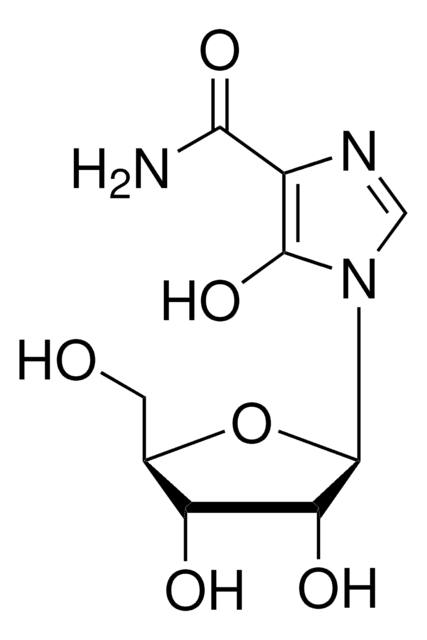I1782
Inosine Monophosphate Dehydrogenase Type II human
recombinant, expressed in E. coli
Synonym(s):
IMP:NAD oxidoreductase, IMPDH II
Sign Into View Organizational & Contract Pricing
All Photos(1)
About This Item
MDL number:
UNSPSC Code:
12352204
NACRES:
NA.54
Recommended Products
recombinant
expressed in E. coli
form
solution
specific activity
≥0.05 units/mg protein
mol wt
~55 kDa
packaging
vial of ≥0.002 unit
UniProt accession no.
relevant disease(s)
cancer
shipped in
dry ice
storage temp.
−70°C
Gene Information
human ... IMPDH2(3615)
Related Categories
General description
Inosine Monophosphate Dehydrogenase Type II (IMPDH2) is a ubiquitously expressed dominant isoform during developmental stages. IMPDH2 gene is mapped to human chromosome 3p21.31.
Application
Inosine Monophosphate Dehydrogenase Type II human has been used to test the inhibitory effect on vacor adenine dinucleotide (VAD) on its dehydrogenase activity.
Biochem/physiol Actions
Inosine Monophosphate Dehydrogenase Type II (IMPDH2) binds to adenosine triphosphate (ATP) and guanosine triphosphate (GTP). It catalyzes the formation of xanthosine monophosphate from inosine monophosphate in the presence of nicotinamide adenine dinucleotide (NAD). IMPDH2 elevated levels in tumors are correlated to its rate-limiting activity in guanosine monophosphate (GMP) synthesis. High levels of IMPDH2 is implicated in glioblastoma (GBM). It is regarded as a potential therapeutic target against tumors, antiviral, and immunosuppression-related pathologies.
Type II is the predominant IMPDH isoform and is specifically linked to a wide range of cancers and lymphocyte proliferation.
Unit Definition
One unit will produce 1.0 μ mole of XMP from IMP with corresponding reduction of β-NAD per minute at pH 8.0 at 25 °C.
Physical form
Solution in 20 mM Tris-HCl, pH 8.0, containing 0.5 mM EDTA and 1 mM DTT.
related product
Product No.
Description
Pricing
Storage Class Code
12 - Non Combustible Liquids
WGK
WGK 1
Flash Point(F)
Not applicable
Flash Point(C)
Not applicable
Personal Protective Equipment
dust mask type N95 (US), Eyeshields, Gloves
Certificates of Analysis (COA)
Search for Certificates of Analysis (COA) by entering the products Lot/Batch Number. Lot and Batch Numbers can be found on a product’s label following the words ‘Lot’ or ‘Batch’.
Already Own This Product?
Find documentation for the products that you have recently purchased in the Document Library.
Bertrand Daignan-Fornier et al.
Cells, 8(1) (2019-01-20)
Purine nucleotides are involved in a multitude of cellular processes, and the dysfunction of purine metabolism has drastic physiological and pathological consequences. Accordingly, several genetic disorders associated with defective purine metabolism have been reported. The etiology of these diseases is
Travis J Loya et al.
Nucleic acids research, 40(15), 7476-7491 (2012-05-09)
The yeast IMD2 gene encodes an enzyme involved in GTP synthesis. Its expression is controlled by guanine nucleotides through a set of alternate start sites and an intervening transcriptional terminator. In the off state, transcription results in a short non-coding
Rebecca R Midtkandal et al.
Bioorganic & medicinal chemistry letters, 22(16), 5204-5207 (2012-07-17)
2-Deoxy-C-nucleosides are a subcategory of C-nucleosides that has not been explored extensively, largely because the synthesis is less facile. Flexible synthetic procedures giving access to 2-deoxy-C-nucleosides are therefore of interest. To exemplify the versatility and highlight the limitations of a
Lizbeth Hedstrom
Critical reviews in biochemistry and molecular biology, 47(3), 250-263 (2012-02-16)
The inosine monophosphate dehydrogenase (IMPDH)/guanosine monophosphate reductase (GMPR) family of (β/α)(8) enzymes presents an excellent opportunity to investigate how subtle changes in enzyme structure change reaction specificity. IMPDH and GMPR bind the same ligands with similar affinities and share a
Veeraraghavan Usha et al.
PloS one, 7(3), e33886-e33886 (2012-04-06)
Tuberculosis (TB) remains a leading cause of mortality worldwide. With the emergence of multidrug resistant TB, extensively drug resistant TB and HIV-associated TB it is imperative that new drug targets be identified. The potential of Mycobacterium tuberculosis inosine monophosphate dehydrogenase
Our team of scientists has experience in all areas of research including Life Science, Material Science, Chemical Synthesis, Chromatography, Analytical and many others.
Contact Technical Service







